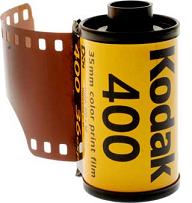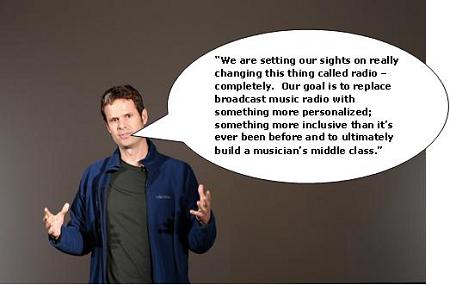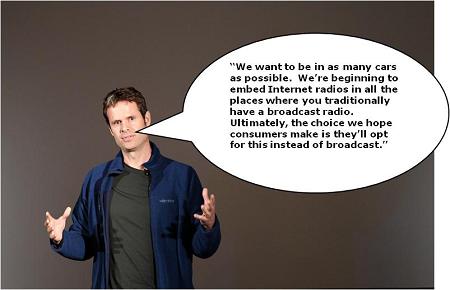The last couple weeks of 2011 were a mixed bag featuring several strange days indeed for broadcast radio. At a typically slow time of year around the holidays, it seemed like there were big events happening daily. Like in every other business, things move in cycles, and the big story even during the supposed quiet days before Christmas revolved around Pandora.
Defining Pandora.
Measuring Pandora.
Excluding Pandora.
Explaining away Pandora.
Sadly, it feels like radio is entering the political arena – doing and saying anything it can to discredit and minimize a competitor in every way possible. In the process, by trying to make Pandora look bad, broadcast radio may be looking bad.
Pandora is popular and has grown a great deal over the past couple years, but we know it has a dubious financial model. And the early results of its IPO suggest that the investment community has its doubts, too.
Tim Westergren has spoken in ominous tones, but radio has not done much to address the potential threat posed by Pandora. As we reported in this blog back in late 2009, Westergren said the following at a meet-up here in the Detroit area that I attended:
OK, he probably left that “middle class” stuff on the drawing board when he made his IPO pitch, but you “get” the magnitude of Pandora’s goals.
Here’s another Westergren quote from another time:
And he wonders why the powers that be in broadcast radio are a little bent out of shape about the rise and rise of Pandora. You have to give him this – he’s a wartime general who tells you exactly what he’s going to do. The question is, what does broadcast radio do?
There’s nothing new here about Pandora’s rise. Everyone has seen the metrics, and the last several of our Techsurveys have illustrated the threat that Pandora specifically, and Internet radio in general, represents among core radio listeners.
Our company identified Pandora as a bona fide competitor, when many broadcasters ignored the early warning signals. In 2009, I had conversations with “higher-ups” in radio, some of whom criticized me for overstating Pandora’s growth – despite data that has since reinforced our findings. We have warned about Pandora’s local market sales efforts. They recently announced a live video concert series sponsored by Budweiser, an event that should cause some sleeplessness for every Rock radio GSM reading this.
In short, we have used every bit of influence our company has – in our research, at industry conventions, in our blog, and in articles – to alert radio to the need to take Pandora seriously – and to act accordingly.
So what’s the best way for radio to deal with this threat – or this opportunity?
For a moment, let’s step away from radio and go “outside” for a teaching moment. Think about the photography business. Imagine you’re back at Kodak in the ‘80s as digital technology is emerging, and your corporate chieftains are saying something like this:
“Digital isn’t really photography. Photography is defined as buying a roll of film, inserting it into the camera, taking pictures that exhausts the film supply, removing the film from the camera, and taking the roll of the film to a drugstore or Photomat, waiting a day or two, paying for the processing, and picking up the pictures – some of which look good but most are terrible. That’s photography. So you can’t say that “digital photography” is really photography because it doesn’t use film and doesn’t need to be processed.”
Except that to the consumer, digital photography was a pretty cool idea – and a major leap beyond the time-honored (expensive, inefficient, clunky) process of taking pictures using film. It was cheaper, provided the opportunity to take more photos and evaluate them in real time, and bypass the drugstore entirely.
In short, it provided consumer value and a better way of enjoying the picture taking process.
 Kodak actually invented digital photography, but opted not to release or market it. Their “research” (apparently among mostly professional photographers) found that digital was inferior to film. So they sat on it, hoping that digital would never catch on. They could have literally owned digital instead of allowing themselves to be victimized by it. Instead, last week, Kodak filed for bankruptcy.
Kodak actually invented digital photography, but opted not to release or market it. Their “research” (apparently among mostly professional photographers) found that digital was inferior to film. So they sat on it, hoping that digital would never catch on. They could have literally owned digital instead of allowing themselves to be victimized by it. Instead, last week, Kodak filed for bankruptcy.
Is radio playing this like Kodak did? Instead of arguing about whether Pandora is or isn’t radio, wouldn’t it be smarter to learn what consumers are thinking, feeling, and doing – and then incorporate that learning into radio’s brands?
This week, we’ll dig deeper into radio’s reaction to Pandora, and provide suggestions about where to go from here. But tomorrow, we’ll hear from a “Kodak Kid” with a cautionary tale for radio.
- What To Do If Your Radio Station Goes Through A Midlife Crisis - April 25, 2025
- A 2020 Lesson?It Could All Be Gone In A Flash - April 24, 2025
- How AI Can Give Radio Personalities More…PERSONALITY - April 23, 2025






I’m sure you will cover this as this series marches on – but this opening piece didn’t mention I Heart Radio at all. When you look at the resources and effort placed here and now with Greater Media, Cumulus and other groups joining in it looks to be a pretty strong contender – right? Of course you are right that Pandora is serious competition and the Auto world is paying attention and including them in the dashboard of the future. It would be interesting to hear from the marketing mavens @GM @Ford — what are they thinking? Looking forward to the week.
I don’t see any way radio can “fight” Pandora with its terrestrial product. That opportunity vanished with live talent. What would the marketing say – “Terrestrial radio – no personalization, more ads, inferior sound!”
Radio could build a better Pandora – there are ways the algorithm could be improved, they could add customizable localization and better personalization features. But under the current royalty structure, every listener radio converted would cost them money.
The best way to fight Pandora is to get the royalty structure fixed then take them on. The first entry into a segment doesn’t always win and one can presume that radio has more programming talent and resources at its disposal than Pandora.
Changing the royalty situation enough to make a better version of Pandora profitable will probably require some real street fighting with the music industry. Radio has a huge listener base, free airtime and a universally hated music industry as leverage. Hoping that Pandora will go broke, shut down, leaving everyone no option but to come running back to voice-tracked hits (from the genre and 20 year span of your choice) researched in the nearest top 10 market is probably not radio’s ideal strategy.
The clock is ticking…
I almost forgot – I heart radio isn’t as good as Pandora, IMO – and it would have to be noticeably better to really compete with them.
Dave & Bob, thanks for the time and for posting thoughtful comments. iHeartRadio’s progress in the last several months is impressive and their inclusive stance is a positive sign, especially for a company that has historically been anything but. However, the challenge posed by Internet radio and connected cars goes well beyond a single company and a directory of streaming stations. Broadcasters treat their streams as second class outlets, often ignoring changing consumer needs. Radio – like Kodak – has the technology, the know-how, and even some of the necessary content to compete at these high-stakes tables. Will “Pandora Denial” get in the way?
Hi Fred –
Radio is a distribution platform pure and simple. What you share / distribute and it’s relevance to the listener will always be the key to success or failure. Don’t focus on competitors…focus on customers. Focus on people not platforms. We’re not even looking at who is going direct to our customers and cutting out the marketing middleman. Amazon.com is a bigger problem for unfocused broadcasters than Pandora. Amazon has emails and credit card numbers while we celebrate cume. Listener obsession is our best defense and path to staying relevant in their world and on their terms. Every minute you spend talking about Pandora is a minute you didn’t invest in learning about your customer.
Mike, thanks as always. The customer focus continues to be the key. If we did a better job keying in on what our audience wants and needs, we’d all be better off. Appreciate you taking the time and reading our blog.